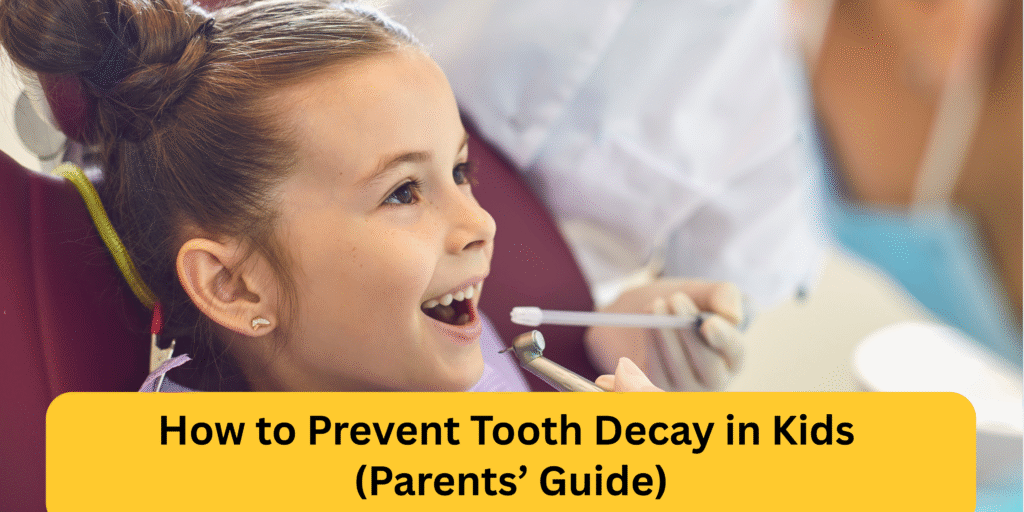Tooth decay is one of the most common childhood health problems worldwide. Cavities not only cause pain and discomfort but can also affect your child’s eating habits, speech, and confidence. The good news is that tooth decay is preventable with the right oral care and lifestyle habits.
As a parent, you play the most important role in protecting your child’s teeth. This guide will walk you through practical tips on how to prevent tooth decay in kids and set them up for a lifetime of healthy smiles.
🦷 Why Tooth Decay Happens in Children
Tooth decay occurs when bacteria in the mouth feed on sugars from food and drinks. These bacteria produce acids that attack the tooth enamel, leading to cavities. Kids are more vulnerable because:
Their enamel is thinner than adults.
They may not brush or floss properly.
They often enjoy sugary snacks and drinks.
Early dental habits are still developing.
Understanding these risks can help parents take proactive steps to prevent cavities.
✅ 1. Start Oral Care Early
Oral hygiene should begin even before the first tooth appears. For infants:
Gently wipe the gums with a clean, damp cloth after feeding.
Once teeth erupt, use a soft-bristled toothbrush and a smear of fluoride toothpaste (about the size of a grain of rice).
From age 3, use a pea-sized amount of toothpaste.
Early care prevents bacteria buildup and helps children get used to oral hygiene routines.
✅ 2. Teach Proper Brushing and Flossing
Children should brush twice a day for two minutes using fluoride toothpaste. Parents should supervise until at least age 7–8 to ensure proper technique.
Encourage brushing in small, circular motions.
Don’t forget the tongue and gumline.
Introduce flossing as soon as two teeth touch, since toothbrushes can’t reach between them.
Make brushing fun with colorful toothbrushes, flavored toothpaste, or brushing apps that play music for two minutes.
✅ 3. Encourage a Healthy Diet
Diet plays a huge role in preventing tooth decay. Limit sugary and starchy foods that fuel bacteria. Instead, focus on:
Tooth-friendly snacks: cheese, yogurt, nuts, fresh fruits, and crunchy veggies like carrots and cucumbers.
Drinks: water and milk are best. Avoid sodas, packaged juices, and sports drinks.
Treats: If kids have sweets, serve them with meals rather than as snacks. This reduces acid attacks on teeth.
✅ 4. Schedule Regular Dental Visits
The first dental visit should be scheduled by your child’s first birthday or when the first tooth appears. Regular check-ups every six months allow dentists to:
Spot early signs of decay.
Apply fluoride treatments to strengthen enamel.
Suggest dental sealants (thin protective coatings) for molars to prevent cavities.
These preventive steps can save your child from pain and more expensive treatments later.
✅ 5. Avoid Prolonged Bottle or Sippy Cup Use
“Baby bottle tooth decay” happens when babies sleep with bottles of milk, juice, or formula, allowing sugars to pool around the teeth. To prevent this:
Avoid putting your child to bed with a bottle.
Transition from bottles to cups by around 12–18 months.
Offer only water in sippy cups between meals.
✅ 6. Fluoride Is Your Friend
Fluoride strengthens enamel and makes teeth more resistant to decay. Ensure your child:
Brushes with fluoride toothpaste.
Drinks fluoridated water (if available in your area).
Receives professional fluoride treatments from the dentist if needed.
✅ 7. Be a Role Model
Kids learn best by copying their parents. Brush and floss together to show them that oral hygiene is important. Turn it into a family activity so your child feels motivated and supported.
✅ 8. Consider Sealants for Added Protection
Sealants are thin protective coatings applied to the chewing surfaces of molars, where cavities often form. They act as a barrier against bacteria and food particles. Sealants are painless, affordable, and can protect teeth for several years.
🦷 Final Thoughts
Tooth decay in children is common—but it doesn’t have to be inevitable. With early oral care, healthy eating habits, regular dental visits, and preventive treatments, you can protect your child’s teeth and ensure they grow up with a confident, cavity-free smile.
Remember, good dental habits built in childhood last a lifetime. Start small, stay consistent, and make oral care fun for your little one. Their future smile will thank you!

